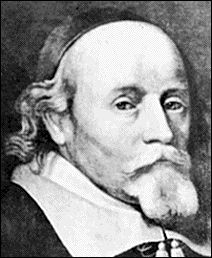 |
 |
Louis de Geer was born 17 November 1587 in Lüttich (Liège) in the Walloon region of today's Belgium. He was the son of a nobleman, Louis de Geer de Gaillardmont, and Jeanne de Neille from Florence. For religious reasons the family moved to Holland where the father gave up his title and became a merchant banker. He taught his son the same trade. After the death of his father Louis de Geer went to live and trade in La Rochelle in France but came back to Holland in 1615 och set up his business in Amsterdam, dealing in weapons and other goods. The two brothers de Besche who had come to Sweden earlier were born in the same town as de Geer, and being old friends they informed de Geer of the immense opportunities there were in Sweden. De Geer got involved in financing the Swedish Government loans in the Netherlands in 1610. At the same time he also started dealing in weapons and in copper with the Swedish Crown. Later, during the 1620´s he became the sole weapon purveyor to the Swedish Army. It wasn't until 1628 that he actually moved Sweden where he applied for citizenship. His headquarters were established in Norrköping, a small town which he built up to become an industrialand trade center of importance. One of his big commissions was the manufacture of weapons. He was very successful and eventually he started producing weapons also for the Germans. He played a very important role in the building up and financing of the Swedish iron trade. After periods back in Holland he decided to settle down in Sweden in 1641, and there he became the owner of enormous estates, and at that time he recieved a knighthood in spite of grumblings in the established nobility. He eventually went back to the Netherlands in 1651 and died there in 1652, but his sons continued to run his businesses in Sweden. A comment: all through his adult life he set aside a tenth of everything he owned to give to the needy. This was a promise he had made to God when he started his career, and he kept that promise, still evident in his thorugh accounts. |
Source: Projekt Runeberg/Svenska Familj-Journalen 1869